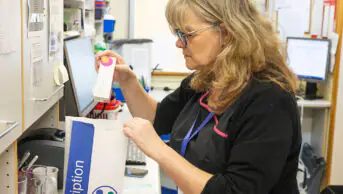
Shutterstock.com
The UK government’s refusal to disclose information relating to the launch of a national minor ailments service for community pharmacy has inferred that a policy on the service is being developed.
A freedom of information (FOI) request submitted by The Pharmaceutical Journal asked the Department of Health and Social Care (DHSC) to disclose discussions it had with the NHS around a potential ‘Pharmacy First’ service in England.
The request was sent after health secretary Sajid Javid said in October 2021 that he was asking his department “to work with the NHS” and look into a national minor ailments scheme for pharmacies England, similar to the NHS Pharmacy First service already running in Scotland.
Through Scotland’s ‘NHS Pharmacy First’ scheme, pharmacists can offer free advice, treatment and referrals to patients presenting with minor conditions and supply treatment for certain conditions, without the need for a patient to visit their GP.
In response to the FOI request, received on 20 January 2022, the DHSC confirmed that it does hold relevant information on the discussions held, but declined to disclose it on the grounds that it “relates to the formulation or development of government policy”, also known as a “section 35 exemption”.
Under the Freedom of Information Act 2000, public bodies are able to withhold information if they believe it falls under one of 23 exemptions, set out in sections 21 through 44 of the act.
“Civil servants, subject experts and ministers need to be able to engage in the free and frank discussion of all the policy options internally, to expose their merits and demerits and their possible implications as appropriate,” the DHSC said in its response.
“Their candour in doing so will be affected by their assessment of whether the content of such discussion will be disclosed.
“Premature disclosure of information protected under section 35 could prejudice good working relationships and the neutrality of civil servants.”
The DHSC also withheld the information “on the grounds that it is commercially sensitive” and could “prejudice the commercial interests of any entity”, including the department itself.
“If the information were released it would disclose the department’s initial thinking which would impact its ability to negotiate with the Pharmaceutical Services Negotiating Committee (PSNC),” the response explained.
“As the information you have requested contains information that has not yet been discussed with PSNC, we consider that its disclosure would likely risk negatively impacting on the Department and [NHS England and Improvement’s] ability to reach an agreement with PSNC and to achieve best value for money for the taxpayer.”
Evidence submitted by the PSNC to the Health and Social Care Select Committee, as part of its inquiry into the ‘Future of General Practice’, suggested that a national minor ailments scheme could save the NHS up to £640m per year.
Alastair Buxton, director of NHS services at the PSNC, said the negotiators have “long called for a ‘Pharmacy First’ service for minor ailments, and we know that patients and local communities are increasingly relying on pharmacies for help with both minor and more serious conditions”.
“It is encouraging that both the health secretary and the pharmacy minister have recently spoken of their ambition to expand pharmacy’s minor ailments role,” he said.
“However, the walk-in advice that pharmacies provide must be fully funded, and we expect this to be a key topic for discussion in the upcoming negotiations on year four of the five-year [community pharmacy contractual framework] deal.”
On 12 January 2022, pharmacy minister Maria Caulfield told the House of Commons that the government is “looking towards a more pharmacy-first model” that would enable patients to access some treatments from pharmacists “without necessarily going first to the GP, opening up primary care and making it much more accessible”.
Read more: Learning resources on minor ailments


